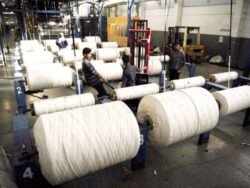Smart Manufacturing in Pakistan

21 February 2024
Published in: The Nation
The landscape of manufacturing has transformed from traditional mechanical processes to a sophisticated integration of information and technology. Technologies now play a crucial role in the manufacturing process and global value chains. In the contemporary landscape, technology stands out as a pivotal infrastructure requirement for national development and plays a crucial role in the economic development of a country.
The evolution of automation and digitization has given birth to Industry 4.0 which is transforming the landscape of manufacturing through smart manufacturing (SM) and intelligent factories. It optimizes operational efficiency, expediency in work output, refines demand forecasting, implements predictive maintenance, enhances worker safety etc. Capgemini Research Institute has found that smart factories could add at least USD1.5 trillion to the global economy through productivity gains, improvements in quality and market share. According to a UK multinational professional services network KPMG Int. Ltd., “In today’s turbulent economy, businesses that are not digitally transformed are at a serious disadvantage.”
Modern manufacturing companies face unpredictable market shifts due to global competition. One significant problem in many countries is that they struggle to keep up with new technologies due to lack of innovation. Leveraging technologies like blockchain and AI for supply chain management can enhance transparency, traceability, and efficiency of manufacturing sector. AI and machine learning have extensive applications in manufacturing, particularly for tasks such as demand forecasting and predictive maintenance by analyzing data. Industry 4.0 has become one of the key economic triggers of China’s long-term economic strategy. Production efficiency of Shanghai’s intelligent factories has increased by more than 50 percent on average. Around 100 of the US’s top companies and institutions, including Microsoft, Honeywell, Johnson & Johnson, have partnered with The Clean Energy Smart Manufacturing Innovation Institute (CESMII). McKinsey’s research reported that, “an effective transformation of the US manufacturing sector could boost GDP by USD275 billion to USD460 billion while adding up to 1.5 million jobs.” China, Germany and Japan are the top three countries in smart factory adoption, followed by South Korea, United States and France.
For developing countries such as Pakistan it is vital to explore new areas of investment and tap markets that can catalyze the process of economic development in the country. The emerging domains of Electric Vehicles (EVs) and batteries, green frontier technologies, fiber optics, AI and semiconductor chip manufacturing offer vast opportunities for Pakistan in the manufacturing sector. Introducing smart manufacturing also means enabling an environment where advanced hi-tech based products can be locally manufactured in Pakistan.
Pakistan’s cordial relations and strategic partnership with China opens various avenues of tech cooperation and development. At the government level, Pakistan has expressed desire for Chinese assistance in the domain of emerging technologies. These included EVs, batteries and semiconductor chips. This necessitates that Pakistan should enable an investor-friendly environment with hi-tech and smart manufacturing capabilities, allowing an atmosphere for tech-based industry in Pakistan.
At present, there is awareness in Pakistan to adopt bold, radical and implementable policy approaches. The Draft National AI Policy of Pakistan 2023 mentions the use of AI in manufacturing by developing consumer goods specific to the global market requirements. Importantly, Foreign Direct Investment (FDI) remains one of the key elements of Pakistan Vision 2025, Strategic Trade Policy Framework (STPF) 2020-2025, and Pakistan Investment Policy (PIP) 2023. PIP aims to diversify Pakistan’s FDI on a broader-range of export oriented sectors including investment in high-quality and technology-driven economy, which is not limited to textile and agriculture. It also aims for cooperation with GCC countries as well as East Asia and Pacific nations for partnerships.
The advancement of the manufacturing sector and associated policies requires collaborative efforts from various stakeholders. Adopting a unified approach that involves the government, industry, and academia is essential to encourage innovation in Pakistan. Despite improvements in the business environment, the regulatory framework still poses challenges, and issues related to government effectiveness concerning implementation of relevant policies still persist. These challenges are further heightened due to institutional complications, difficulty to keep pace with the dynamics of technological transformation and regulatory enforcement obstructions.
As Pakistan shapes its economic trajectory, achieving a harmonious balance between policy development and collaborative implementation is crucial for ensuring sustainable growth and global competitiveness. Public-private partnership would certainly be helpful in fast-tracking investment in IoT, Machine Learning, automation, digitization and blockchain technology to reap the benefits of Industry 4.0. The same model may also be used to establish an advisory committee to steer the industry toward smart manufacturing in Pakistan.





